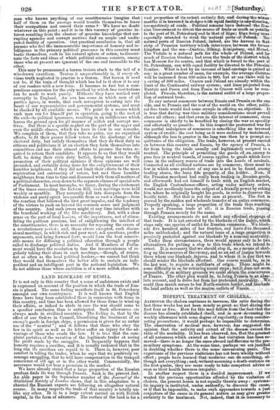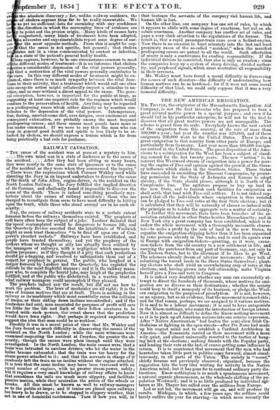HOPEFUL TREATMENT OF CHQUItatteli acadis- ALTHOUGH thecholera -continues-to increase, the
ritiii during thole last three weeks has not lieeultearly:so-great aalthatbalbr"*(theaa first four -or:five. How far this MaYitilloVrfroinithrifactlthat theol disease has already establiehedAtself, {and is gottaidevatraingitav weekly allewance with some degree of regularitaorintaxonorintere7 acting precautions, it would perhapsi, be impossible to bdeterreinwsz The ..observation of .medioalt menaelsoWever; rhai kanggested,the opinion that the activity arid ,CcAelat-rafithe,Idiseasisaexeeediheill ratio of the mortality.: It has:been observed, f000thatithe;greatnitaa of all nnisonces which- e*ieted at the last vititation moved—there is no longertheaiameabsurdindifferenceina the presc:'d monitory.symptorasv, .AtthWsatnetime, dperlfape lard arajnatifiectal
in doubting whether- thefe, eaum unressoning-Jruno. ,Thel ° experience of the previous visitations hair ricitheentwholly without 't
-effect ; people have- learned: f thato medicine soniethingy . al- ' though net everything ; end‘tWithetitassuming a death- seatence the first qualm, they row more ready to take competent advice as soma as their health beeomeairr.egular.- bUip In another. respect there ia;a: decided improvementa;ipliiirend wasted, the previous opportunities: -afforded by the visitatimn of cholera, the present is not equallr systeinaacq -tic, inquiry is instituted, under: atithodtyy to., ;discover the camisald or if that be impossible, to make 'seek. approachestoWaXds a just conjecture of the :cause inite generaluatnre. asimaygiya greater ' certainty to the treatment. -Not, intleedi_tliat.iihohadneoessary absolutai discove.ry aifor; unlike 'railway accidents,' the } efitholuraapptiisa HAL fir to heincally.inserntable. -,We.ti fits yet nosulEcienid data-for 'surmisffig With any:. eonfidegoe the "direction, which the converging slides, /of evidence are : itp. point xint the; prenists.ariginiaddanykinds of causes have conieetured;i man kinds: of ideatanent • halve!. been adapted, Enadirocateis and experimentalists report' &arab degree of sue. cess •it the most epposite methods. ! .From this iii .might ;be sup- P1)}3' that the _maim:is -tot specific,' 'hat, Igeneral4 that cholera on' .tes kustiiti a virat,conimniticated byT contact or infection, stabs of the patient'sgeneral bodily ,health.
here; appears; however,' tole one circuinstanoo,common to most of ■ e-differeat modes of traitraent—it ie an inference that , cholera' • ,atiresa considerable :depression of the vital Poiversitenerally, that a restoration of the,vital powers generally; contributes to !care: In this-way different modes, of treatment might be ex- p alosince, there is.so Muth :sympathy between the vital func- tionsin their activity, that a treatment which would: call one' class into:energetio action might collaterallyimpart a: stitatilns to an- otheri.audspaturewitliont adirect appeal toahe e.ause.- The gene- ral conception, however, is important for the public atlarge, as suggesting at leaationeingatiVerule:for the regimen:which would conduce to-the preservatioeiellsealth. Anything may'be regarded asat predisposing' cause which either direetly or by reaetion •con- tributes to the depresilioni of ithe vital powers. Intemperance, fear,-. fasting, 'unwholesome diet; over-fatigne; 'over-excitement and cossequentiexhaustioni! are probably :arnong, the most frequent, prediaposingcausesi 'and these causes most 'people have :more or leraunder command. i .If we,were to: say that the man who can keep in , general oo& health- and spirits .is, less likely to be at- tacked ibroltolera, we should .exprear a: truism which is far from being practically a bad rule for guidance.
call
be STS likc
and



























 Previous page
Previous page